DECADISTINCTIONS:
OUR COMPETITION RULES AND POLICIES
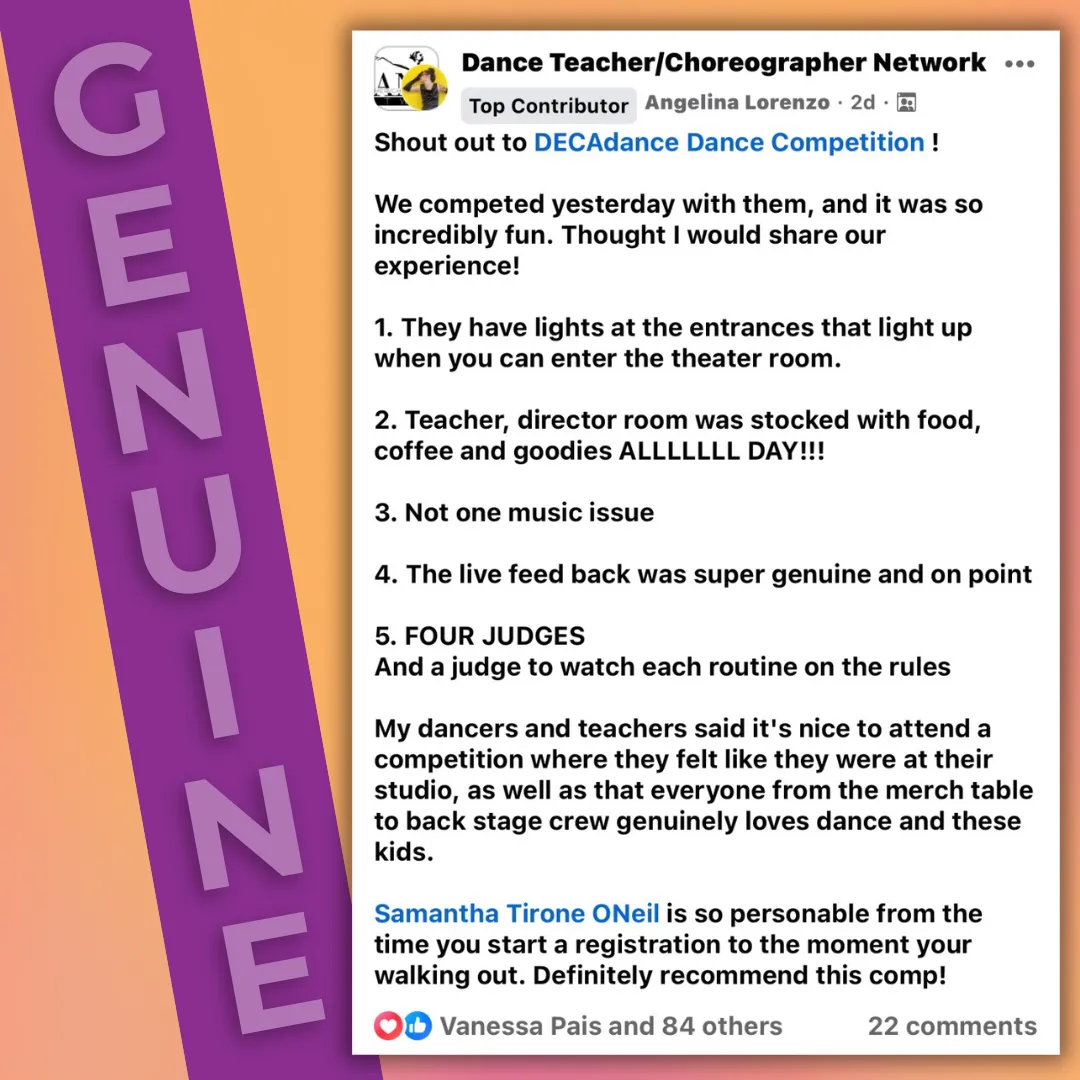
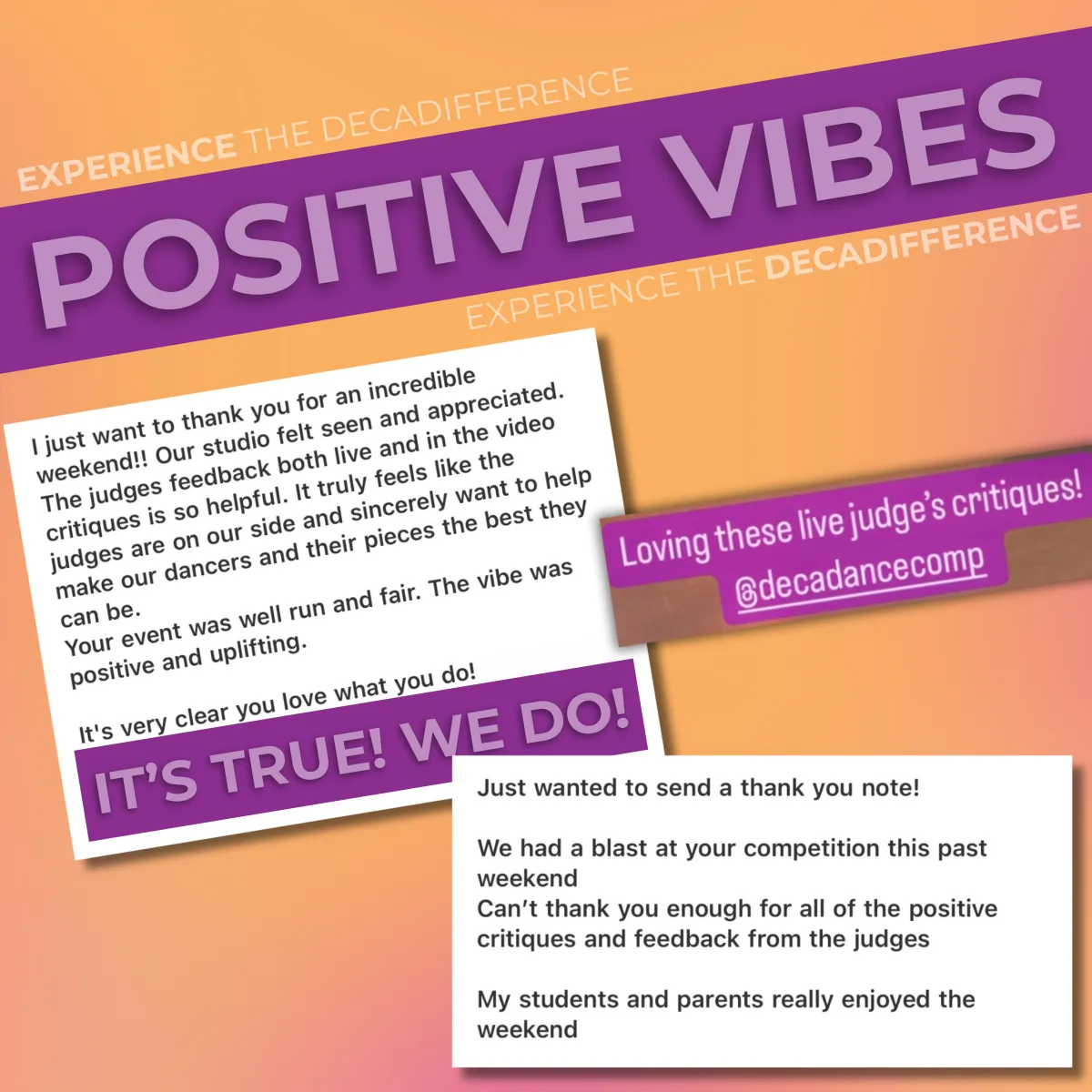
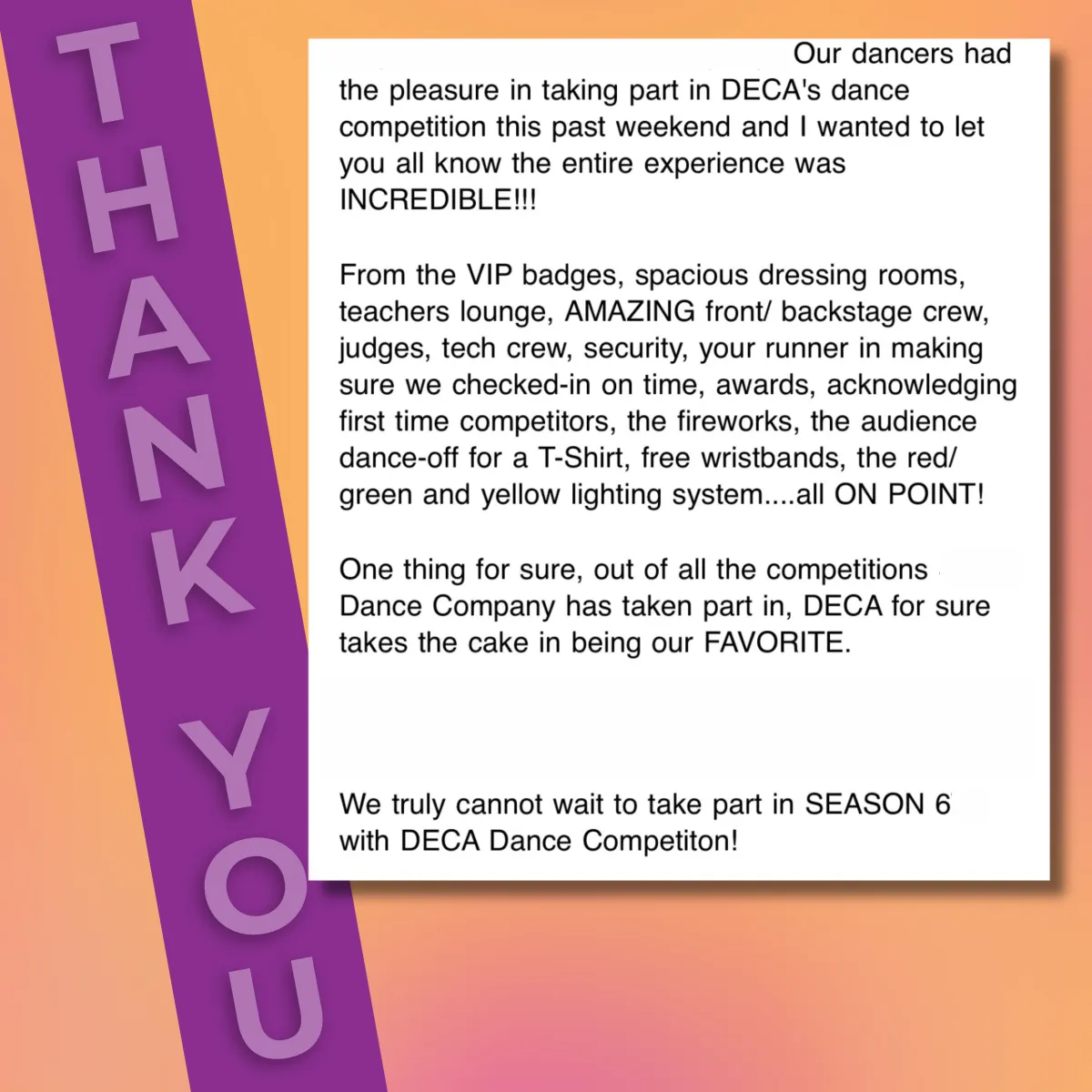
AGE DIVISIONS
Age Divisions:
Petite: 6 and Under
Mini: 7 - 9
Junior: 10 - 12
Teen: 13 - 15
Senior: 16 - 19
Dancers will compete in the category of their age as of January 1st. Each soloist may bring a maximum of two solos per event.
SKILL-BASED LEVELS AT DECADANCE
DECAdance competition levels are not determined by hours of class taken in a week; they are based upon skill and execution of skills.
DECAdance Competition Levels:
Debut: dancers new to competition or demonstrating the fundamental skills below
Intermediate: skill-based as described below
Advanced: skill-based as described below
We are happy to answer questions to help you decide which level is best suited for your dancer(s). The guidelines below will help you get started!
About our DECADistinctions Monitor and moving routines:
We staff a DECADistinctions Monitor at every event who carefully watches every routine. It is their responsibility to consult with all four specialty judges if they feel a routine needs to be moved up or down to the appropriate skill level. If all five judges unanimously agree that a dance should be moved up or down to the appropriate level, the routine will be moved to that level and scored accordingly. Because our Routine Monitor is always a seasoned judge and educator, we trust them with facilitating this decision. Studio owners are always notified of level changes before awards.
There is no penalty for the routine being moved.
Dancers may compete in multiple levels. As soloists, they cannot win title in more than one division. Each soloist may bring a maximum of two solos per event.
DEBUT LEVEL
Dancers new to competition or demonstrating these fundamental skills. This division is a great place for dancers new to the world of competition and/or demonstrating a basic understanding of the fundamentals of dance.
Routines may include:
-Single turns
-Basic leaps/jeté
-Cartwheels
-Walkovers
-Backbends
-Leg stretches
-Basic straight forward timing
-Basic tap combinations
-Minimal formation and level changes
Debut tap dancers may execute rudimentary tap steps/combinations. Phrasing should be basic and not syncopated.
Routines that are choreographed with these elements but are executed with technical precision and timing and/or contain multiple tumbling elements from the Intermediate or Advanced skills list may be considered Intermediate.
INTERMEDIATE LEVEL
If a skill is advanced and is not executed with mastery, it can be considered an intermediate routine. Dancers in this division demonstrate a moderate understanding of fundamentals of dance with added difficulty in rhythms and timing.
Routines may include:
-Double/triple turns or up to 5 consecutive turns, single turn holding the leg, turns in second
-Basic switch leaps, side leaps
-Back handsprings, side aerials, pancake, handspring step out
-Double timing
-More intricate formation/level changes
-Toe rises/drops
Intermediate tap dancers may execute progressive tap combinations with clarity, timing, accuracy and musicality, beginning intricate footwork and rhythms, time steps, maxi turns, cramp roll turns, paddle turns, pullbacks and wings.
Routines with mastery of an advanced skill, excessive speed, intricate patterns and rhythms will be considered advanced.
ADVANCED LEVEL
Dancers in this division demonstrate a significant understanding of fundamentals of dance with added elements to enhance technique and overall performance.
Routines may include:
-Triple+ turns, fouettes, turns in second changing direction, multiple turns holding the leg
-Switching side leaps, switching sissones
-Tumbling out of turn sequences, front aerials, tucks, layout step outs, half, fulls, pancake
-Syncopated timing
-Intricate formation changes and level changes
Tap dancers cleanly execute complex tap combinations with clarity, timing, accuracy and musicality, displaying intricate footwork such as pullback sequences, time step sequences, wing combinations, intricate quick rhythms executed in syncopation.
Turn sequences exceeding 5 or more turns will be considered advanced.
Routines with tumble passes out of multiple turns, tucks and multiple switching leaps will also be considered advanced.
DECADANCE DISTINCTIVE SCORING
With our DECAdistinctive method of adjudication, dancers and their choreographers get more genre-specific technique scores plus they are guaranteed to receive feedback from a pre-screened judge who is an expert in the genre they’re competing in - because we staff every judge’s panel to ensure it. ACRO, TAP, + HIP HOP INCLUDED! For a detailed description of our distinctive scoring system with weighted technique scores, please click here.
Every routine will be scored by four judges. Each judge will have a total score of 75 points. New for 2025, our scoring breakdown has evolved to reflect judges feedback and the talking points our educators feel is most important for dancers to receive at our events.
Adjudication Breakdown:
Technique: 35
Performance + Style: 15
Musicality + Timing: 10
Execution of choreography: 10
Age appropriateness*: 5
Our age appropriateness score applies to choice of routine material, song lyrics and costumes but also to the healthy development of the performing dancer(s). Our educators are focused on the overall health of the dancer, and if they feel the physical movement is too advanced for a dancer's physical or mental development they may score within the Age Appropriateness category as they see fit.
The technique score from the judge that specializes in each specific genre carries a higher rank in the overall tabulation - and their critique is even offered live for soloists in that category. For instance, a group jazz routine will receive critiques and scores from all four judges, but the technique score from the judge designated to the jazz genre carries more weight. If the piece is a solo, in addition to the weighted technique score from the jazz judge, the dancer receives 30-45 seconds of live feedback from that jazz-specific judge.
We are happy to answer any questions about this method of scoring! We've also provided a detailed explanation here.
In the event of a tie, the technique score will be used.
DECADANCE ADJUDICATION AND AWARDS
Advanced:
DECAdent Diamond: 295 - 300
Diamond: 289 - 294.9
Platinum: 279 - 288.9
High Gold: 269 - 278.9
Gold: 259 - 268.9
High Silver: 258 & Below
Intermediate & Debut:
Diamond: 289 - 300
Platinum: 270 - 288.9
High Gold: 260 - 269.9
Gold: 250 - 259.9
High Silver: 249.9 & Below
We offer signature DECAdance awards and scholarships at all competition events, plus industry sponsored awards from our amazing partners at The Association for Dance Competitions and Conventions, Glam'r Gear, Impact Dance Adjudicators, Andrea Mychaels Performing Arts Foundation, Impact Dance Adjudicators and Relative Motion.
DECAdent DANCER AWARD
Recognized for passion, potential and commitment on stage, this award is chosen by our designated Specials Judge at each event. The Mini or Junior dancer chosen is recognized not just for their performance, but for clear commitment and dedication to their training - from the way they present their competition routine to the way they receive their live critique. This is a dancer that our judges can tell is hungry to learn, grow and excel in their dancing and we provide them several opportunities to do just that! Every DECAdent dancer receives a full scholarship to a fall education event with DECAdance: MINI MAYHEM or "un"convention with live music, pending the dancer's age. They receive an invite to FACES OF DECA, our annual industry education event where dancers receive professional media, classes and audition preparation. And to commemorate this special recognition as a DECAdent Dancer, they receive a commemorative t-shirt and medal!
THE DECADANCE 110% AWARD IN HONOR OF ANDREA MYCHAELS
On January 16th, 2024, DECAdance lost one of our family members - our fun and vibrant friend, Andrea Mychaels. Andrea was part of our original panel of judges at DECAdance, with us since the beginning. She was also our founder's jazz teacher in college. She was a fiercely knowledgable and encouraging educator, performer and adjudicator. We miss her very, very, very much. Andrea gave 110% to everything she did - from singing with big bands across the tri-state area to teaching in-studio events with our DECAteam. Her critiques were filled with love and passion and she was always pulling out the best in the young dancers taking the DECAstage. We're proud to honor Andrea's legacy with our 110% Award, which recognizes one soloist at every regional event who exhibits pure passion, performance and unlimited energy on stage. In partnership with the Andrea Mychaels Performing Arts Foundation, we award each recipient of the 110% Award a Relative Motion scholarship. We send the dancer's performance video from their event with DECAdance to Relative Motion, a fellow family-owned dance education company with a perfectly summed up motto of "anatomy simplified, technique amplified." They watch the soloist's performance and provide customized, anatomy-based feedback for the dancer as well as three months of access to their library of exercises. It's an amazing opportunity for each dancer to zero in on very specific physical exercises that will strengthen their dancing and add sustainable practices to their toolbox that they can use anytime, anywhere. The 110% Award recipient also receives a full scholarship to a DECAdance "un"convention with live music, a FACES OF DECA invite, a plaque honoring their work and a t-shirt. The idea for this award came organically at our first event of the season in 2024, mere days after Andrea's unexpected passing. We thank the dancers who showed up with such incredible energy to inspire this opportunity and look forward to honoring Andrea's legacy this way. In Andrea's honor, remember to move, dance, STRUT through your week and as always, yay dance!
SPIRIT OF DECA AWARD
The dance industry can feel VERY big, but it is actually VERY small. We are all very connected - everyone knows someone who knows someone we know. The DECAdance team, including our backstage and technical staff, interact with dancers and teachers at competition events more than anyone else - and all of us are teachers, dancers or artists ourselves. That’s why we choose the SPIRIT OF DECA award to recognize professionalism, preparation, communication and respect from a studio who came not just to compete but to be in community with their fellow artists. We present the SPIRIT OF DECA award not just as a pat on the back for showing up and treating people kindly but as a reminder that how you show up to these weekends is equally as important to how many trophies you take home. How people feel when they are in your presence at these events MATTERS, and it is how artists show up to take the stage and how artists show up to work that will be remembered - and that’s across ANY industry, not just dance. For showing up with professionalism as great artists and GREAT humans, we present the SPIRIT OF DECA award at select events.
D E C A AWARDS
Our acronym that makes up the word DECA is Dedication, Education, Creativity and Artistry. Since we started DECAdance in 2019, we’ve always had our judges panel choose group routines to be recognized for CHOREOGRAPHY and ENTERTAINMENT. This season, we’re excited to debut our new Dedication, Education, Creativity and Artistry awards to elevate those awards to the next level and nurture the dancers and all of the work they’re putting into their training and performances here at competition. These awards include scholarships to DECAdance education events and special recognition for the dancers AND their teachers/choreographers. Each award was created with intention and care to be very special and we don't want to give away too much of the surprise here on the website. To experience them on site will be a true celebration!
GLAM'R SPECIAL AWARD
DECAdance is proud to offer the GLAM'R SPECIAL AWARD for the Debut Division at each event, sponsored by Glam'r Gear! At each regional event, our Special Awards judge chooses a Petite or Mini from the Debut Division to receive a Glam'r Gear bag AND a scholarship to a 2025 MINI MAYHEM event of their choice! They also receive a FACES OF DECA invite for our July 2025 event! This season, recipients at regional events will receive Glam'r Gear's newest product: their gender neutral CrossBody bag with dividers and pockets for all the dance competition essentials these young dancers are learning to take responsibility for themselves! And at DECAdance Nationals - the GLAM'R SPECIAL AWARD recipient will receive a FULL GLAM'R GEAR TRAVEL BAG! Learn more about our partnership with Glam'r Gear on our Partners page here!
MAKING THE IMPACT AWARD
Being an IDA-affiliated competition grants us the unique opportunity to offer the MAKING THE IMPACT award at all regional events! The IDA judges on each panel select one routine from the entire event to be recognized for their outstanding performance, execution, or choreography. This award can go to a dance of any size, age and level. Winners of the MAKING THE IMPACT award receive a live studio shoutout on the MAKING THE IMPACT dance podcast created by IDA founder Courtney Ortiz and her co-host, Lesley Mealor, one of our DECAdance judges in 2024! AND... all MAKING THE IMPACT award recipients from all IDA-affiliated competitions throughout the regional season have the chance to win a full studio spotlight interview at the end of the season through the podcast's fan favorite voting contest! Last season, we were honored that an attending DECA studio was voted to receive this opportunity after winning the MAKING THE IMPACT award at our DECAdance Meadowlands event! You can listen to their episode here or wherever you listen to your favorite podcasts! To quote our partners at IDA: "Winning the Making The Impact Award has become a huge honor in the competitive dance world and we are excited to help recognize studios and dancers who are #MakingTheImpact with help of our IDA affiliates!"
The ADCC STUDIO OF EXCELLENCE AWARD
New for 2025 is our proud induction into the ADCC: The Association of Dance Competitions & Conventions. This membership is only available to dance competition companies who have been in service to the industry for five years or more, and we are so proud to celebrate our sixth season with this membership! At each group event, our judges panel will choose the ADCC Studio of Excellence. The Studio of Excellence Award is given by participating ADCC member competitions to a studio that best exemplifies the values of The ADCC, which include working together and striving for excellence. This award will replace the former TECHNIQUE award at DECAdance, as we'll support our judges in choosing the studio who best represents excellence in technique, teamwork and treatment of their fellow dancers throughout their competition experience.
DECADANCE SPECIAL AWARDS
A creative celebration of any and all routines that our designated DECADistinctions Monitor & Special Awards Judge feels called to recognize. All five adjudicators may weigh in on DECAdance Special Awards during each session. They are a fun and fabulous way to build confidence in performers of all ages and levels.
HIGHEST SCORING BY GENRE
The highest scoring GROUP routine in each genre will be recognized! We feel this is an important way to honor multiple styles of dance that might not otherwise be highlighted in overall awards. The following genres must have more than 3 entries in order to be recognized.
Acro
Ballet + Pointe
Jazz/Street Jazz + Ethnic/Folk Dance
Hip-Hop
Modern, Contemporary + Lyrical
Musical Theater + Character
Open + Acro
Tap Dance
TITLE FOR SOLOISTS
All Soloists in the Intermediate and Advanced divisions are eligible for title. To determine the DECAdance Title Winner, the highest scoring solo routine in each genre is selected. If there is a dancer with multiple highest scoring solos, the highest is eligible. From those routines, the top three highest technique scores determine the 2nd Runner Up, 1st Runner Up and Title Winner. DECAdance Competition does not divide title by gender. Each soloist may bring a maximum of two solos per event.
OVERALLS
Soloists may bring two solos maximum per event. In line with our DECADistinctions and to provide the fairest competition possible, soloists may have both solos place in overalls as their placement is score-based and overalls are calculated in order of highest scoring routine regardless of who performed it.
Top overalls will be awarded to solos, duo/trios, groups, lines and productions that have a minimum of three routines in each division.
Select winners will be awarded additional scholarships, prizes and opportunities at the discretion of the judges. All dances are eligible.
CATEGORIES & DANCERS
Every entry will be placed in one of the following categories based on the descriptions that follow:
Solo: 1 Dancer*
Duo: 2 Dancers
Trio: 3 Dancers
Small Group: 4-9 Dancers
Large Group: 10-17 Dancers
Line: More than 18 Dancers**
Production: More than 18 Dancers***
*Each individual dancer may bring two solos maximum per event.
**Routines entered as a Line are to be entered as one style of dance AND only have zero to minimal handheld props.
***Routines entered as a Production can have multiple styles of dance and will compete under the "Production" title. Productions can include props, sets and scenery etc.
Please note, that Line and Production routines will not be combined in overall awards.
GENRES & STYLES
Routines must be performed 75% in the registered genre.
We cap acro tricks at 3 per routine unless registered as an Acro, Acro Contortion, Hip Hop or Open piece. Acro tricks are counted when the dancer is upside down and their feet have left the floor. Tumbling passes count as multiple acro tricks. Transitional movements are NOT considered acro tricks.
About our DECADistinctions Monitor and moving routines:
We staff a DECADistinctions Monitor at every event who carefully watches every routine. If they count 4 or more acro tricks in a non-Acro/Open piece or they feel a routine with multiple styles is better adjudicated in the Open category, it is their responsibility to consult with the specialty judge of the category a dancer is competing in and the specialty judge of the category they feel the piece should be moved to. If all three judges agree a routine needs to be moved into a different genre, the routine will be moved to that genre and scored accordingly with the specialty judge of the correct genre holding the weighted technique score. Studios will be notified before awards of routines moved.
Student Choreography:
DECAdance welcomes and encourages student choreographers to bring their pieces to competition. We staff a specialty Student Choreography judge at every event. Student choreography will be registered in the style/genre of the piece so that the weighted technique score is from the genre-specific judge pertaining to their piece. They will receive specific choreography feedback, advice and critiques from both of these judges, while our other two judges will critique as normal with focus on technique, performance, etc. Please notify DECAdance that the piece is a student choreography piece so it can be adjudicated accordingly.
Please register dances in accordance with the following genres/styles of dance. We are happy to help with this if you have any questions at all.
Acro: Routine containing acrobatic and gymnastic moves. Choreography must also contain 50% dance technique.
Acro Contortion: Routine contains extreme flexibility and expression of extended control in over stretched positions. Balancing canes, silks and other apparatus can be used in this category. Acro/tumbling passes are acceptable in this category.
Ballet: Routine consisting of classical ballet movement and technique. No acrobatic tricks are permitted in this category.
Character: Dancers must portray an easily recognizable character or perform a themed dance with a storyline. Pieces that contain more than 3 acrobatic tricks in this genre should be registered in the Open category.
Contemporary: Routine consisting of a fusion of contemporary jazz/lyrical technique. Pieces that contain more than 3 acrobatic tricks in this genre should be registered in the Open category.
Ethnic/Folk: Routine containing a cultural dance (ie African, Bollywood, Flamenco) or folkloric choreography.
Hip Hop Commercial: Routine consisting of mostly hip hop or street style moves that would be found in modern pop music videos and culture. Routine may contain more jazz influence.
Hip Hop Street: Routine consisting of mostly hip hop or street style moves that are rooted in grooves, popping, locking, tutting, breaking.
Jazz: Routine consisting of primarily jazz technique including stylized technique and/or classic jazz transitions. Pieces that contain more than 3 acrobatic tricks in this genre should be registered in the Open category.
Street Jazz/Fusion: Routine consisting of primarily jazz technique and some hip hop influence.
Lyrical: Routine that is choreographed to the lyrics of a song and demonstrates connection to story as well as balance, extension, isolations and control. Please note that if a piece is choreographed to a song without lyrics and is registered in the Lyrical category, our judges will move it to the Contemporary or Open category. Pieces that contain more than 3 acrobatic tricks in this genre should be registered in the Open category.
Modern: A form of dance based on interpretation or other origins of dance, performed in an abstract or contemporary mode. Technique should emphasize contract and release, fall and recovery and horizontal movements developing the relationship with the dancer and the floor.
Musical Theatre: Routine that showcases storytelling and character work, most often choreographed to a song from a Broadway or movie musical. Please note that if a piece is choreographed to a song from a Broadway or movie musical but does not showcase storytelling or character work, it falls in the Jazz category and our judges may move pieces between these two categories when they deem necessary.
Open: Routine consisting of more than one style of dance or that does not fit into any other category. Routines of any style that contain more than three acrobatic tricks (including Contemporary, Jazz, Musical Theater and Lyrical). Routines that contain more than three acro tricks may be moved to this category at an event if they are registered as a genre other than Acro, Acro Contortion, Hip Hop or Open. Vocal may compete in this division.
Pointe: Routine containing safe pointe technique. At least 50% of the performers must be on pointe. Category only available in the Intermediate and Advanced Levels. No Acrobatic tricks are permitted in this category. Please contact us ahead of time to discuss the use of rosin on our sprung birchwood floor.
Tap Dance: Routine consisting of tap dance technique and rhythms for at least 75% of the piece. No prerecorded tap sounds allowed. Tap shoes must be worn to perform.
THE DECADANCE LEGACY CUP

All season long, DECAdance Competition will recognize the highest scoring group routine of each event in the Intermediate and Advanced levels for 12 and under and 13 and over. All highest scoring advanced routines will be eligible for the LEGACY CUP. After the final regional event of the season, the three highest scoring advanced group routines from the entire season will be announced. At our Nationals event each summer, we will announce the WINNERS of the LEGACY CUP in the 12 and under and 13 and over age categories. If one of the contending studios is attending our Nationals event, they will also perform before our DECADance-Off!
Legacy Cup recipients will house the physical award in their studio for the rest of the calendar year. All Legacy Cup winners will receive a plaque to display in their studio for years to come, reminding them of all their Dedication, Education, Creativity and Artistry as a team!
2024 LEGACY CUP FINALISTS






JUDGES
Every DECAdance event has four judges on the panel who offer adjudications and critiques PLUS a fifth judge who focuses on Special Awards and monitors routines to ensure they align with all DECAdance policies. Each judge's panel is staffed with a combination of our DECAdance in-house judges and judges from Impact Dance Adjudicators.
Each judge's panel is carefully staffed to ensure all genres being performed have a corresponding specialty judge who can offer both live and recorded critiques - including specialty genres such as acro, tap and hip hop. The corresponding specialty judge for each genre will also carry a higher technique score for each routine performed in that genre. For example, if a Jazz routine is on stage, the judge specializing in Jazz will have a score that is weighted slightly higher in the technique category of adjudication. Additionally, all soloists will receive a live critique after their performance on stage by their specialty judge. Read more about this distinctive genre-specific method of scoring and critiquing here.
DECAdance in-house judges and Impact Dance Adjudicators are educators first, and they are all background-checked, pre-screened and highly qualified. All dances will compete in their registered category and if any dance does not follow the guidelines for each level, DECAdance reserves the right to place any and all dances in the category or level the judges deem appropriate to ensure a fair and level playing field for all competitors. If our Routine Monitor and/or all four judges on the panel unanimously decide that a dancer should be moved up a level, the studio director will be notified.
DECAdance stands firmly behind dancers dancing to age appropriate music, in age appropriate costumes and performing age appropriate movement. If age appropriateness is neglected, that will reflect in the score the dance receives.
DECAdance reserves the right to disqualify any number that is deemed inappropriate. In the event disqualification is the action, the choreographer/studio director will be contacted directly in regards to the matter. DECAdance Competition reserves the right to withhold the release of any photos or videos that are deemed inappropriate.
MUSIC
Music will be uploaded through the registration portal. Studio directors are advised to provide backup copies on iPod/iPad/CD.
All music must be uploaded no later than 7 days prior to the event. Any music uploaded within 7 days of the start time of the event will be subject to a $25 late fee. If you have any difficulties, please contact us at info@DECAdanceCompetition.com.
Time Limitations:
Solo: 2:45
Duo/Trio: 3:00
Small & Large Groups: 3:00
Line: Up to 6:00
Production: Up to 10:00
Any routine needing additional time must contact DECAdance directly.
$1 per additional minute per dancer.
PROPS
No props should exceed 8 feet.
No liquid or fire.
Any items needing to be swept must be removed by a representative from the performing studio.
Props should be set up within 2 minutes of the first piece entering the stage and removed within 2 minutes from the time the dancers exit the stage. Prop set up and removal times that are exceeded will result in a point deduction in the overall score from each judge.
PAYMENT
All studios planning to attend a DECAdance event must hold their spot with a $500 deposit. Deposits are non-refundable, but may be rolled over into a later event within the same season if cancellation occurs within 60 days of the start of the event. If cancellation occurs within 60 days of an event start date, the deposit is surrendered.
Once a deposit is made, studio directors will receive registration deadlines for each event. Please note that individual event schedules will be distributed 10-14 days before each event. We are unable to release your studio’s schedule until your final payment has been received on the event payment date provided in our competition planning guide.
Payments are accepted via the registration portal as well as checks and Zelle. Any payments received after the due date are subject to late fees of 10%+. Payments will not be accepted onsite. Returned checks will be charged a $50 fee. Any fees not paid prior to the start of the event will result in those dances not being permitted to compete. Schedule requests that are made within 7 days of the event that are not at the error of DECAdance will be charged a fee. Payments received after the final payment date listed below for each event will incur a late fee.
Studios of ALL sizes are welcome at DECAdance. Flexible deposit and payment options are available. Please communicate with us so we can support your studio's needs.
SAFETY
For the safety of dancers, please refrain from having multiple teachers backstage. We also ask that parents refrain from the check-in and backstage areas. After the completion of your studio's routine please clear the backstage area.
Studio staff will have DECA ID tags. This will allow you backstage and up at the booth in the case of emergency or technical issue.
Security staff will be placed throughout the venue to ensure that doorways, halls and other entry and exit routes are clear in the event of an emergency.
VIDEO, PHOTOGRAPHY & LIVESTREAM
All DECAdance events will be professionally photographed and recorded. These files are included at no additional cost.
All studio directors will have access to photos, videos and judges critiques within 30 days of the event.
All files will be password protected for the safety of each and every dancer.
No photography or videography is permitted.
Any studio filming another studio's routines will be disqualified from overalls and compete for adjudication only.
Any person filming routines from another studio will be asked to leave the premises.
Any event that is live streamed will be password protected for the safety of the dancers.
This information is not shared publicly by DECAdance Competition.
Please contact your studio owner directly for any links for photos, videos and livestreams.
All events are intended to be live-streamed. Each venue holds certain limitations on internet and there is no guarantee that the livestream will be available for every event.
COLLABORATION CREATES COMMUNITY
We are proud to partner with these amazing industry leaders who are paving the way for a healthy and inclusive dance industry for ALL. Not just dancers, but adjudicators, studio owners, artistic leaders, educators, families and their communities as well.
Read more about our partnerships and their contributions to DECAdance Competitions & "un"conventions here!
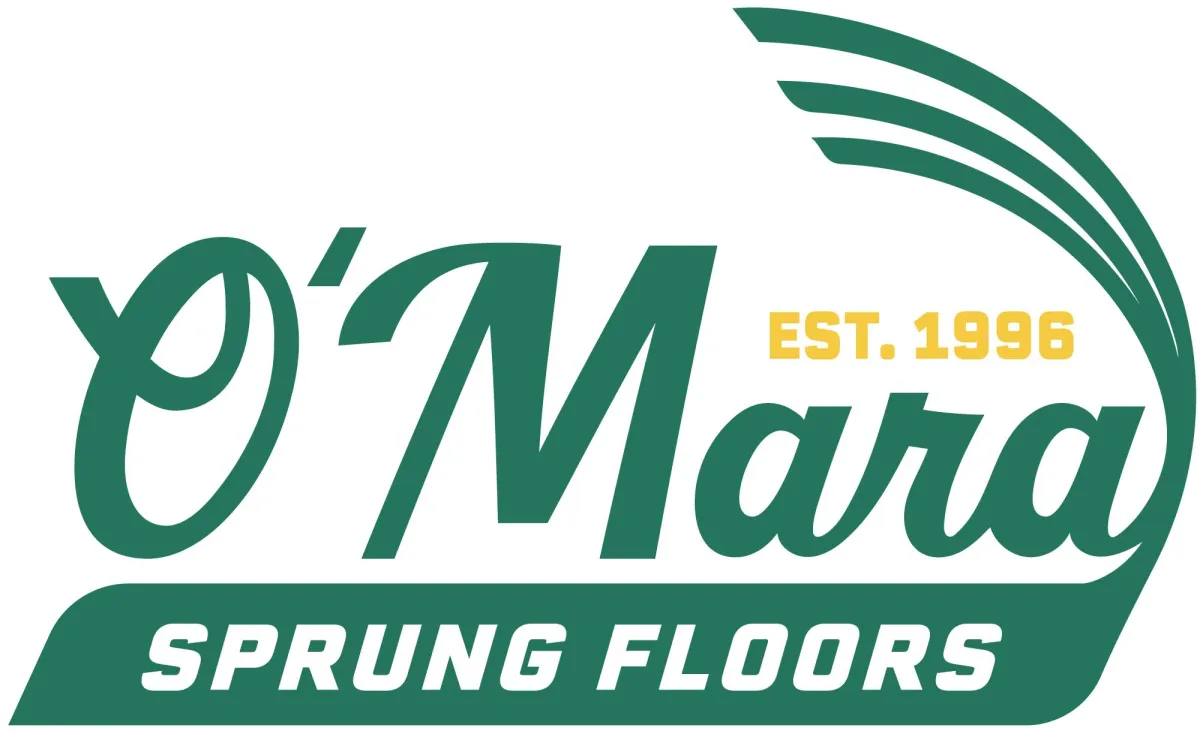


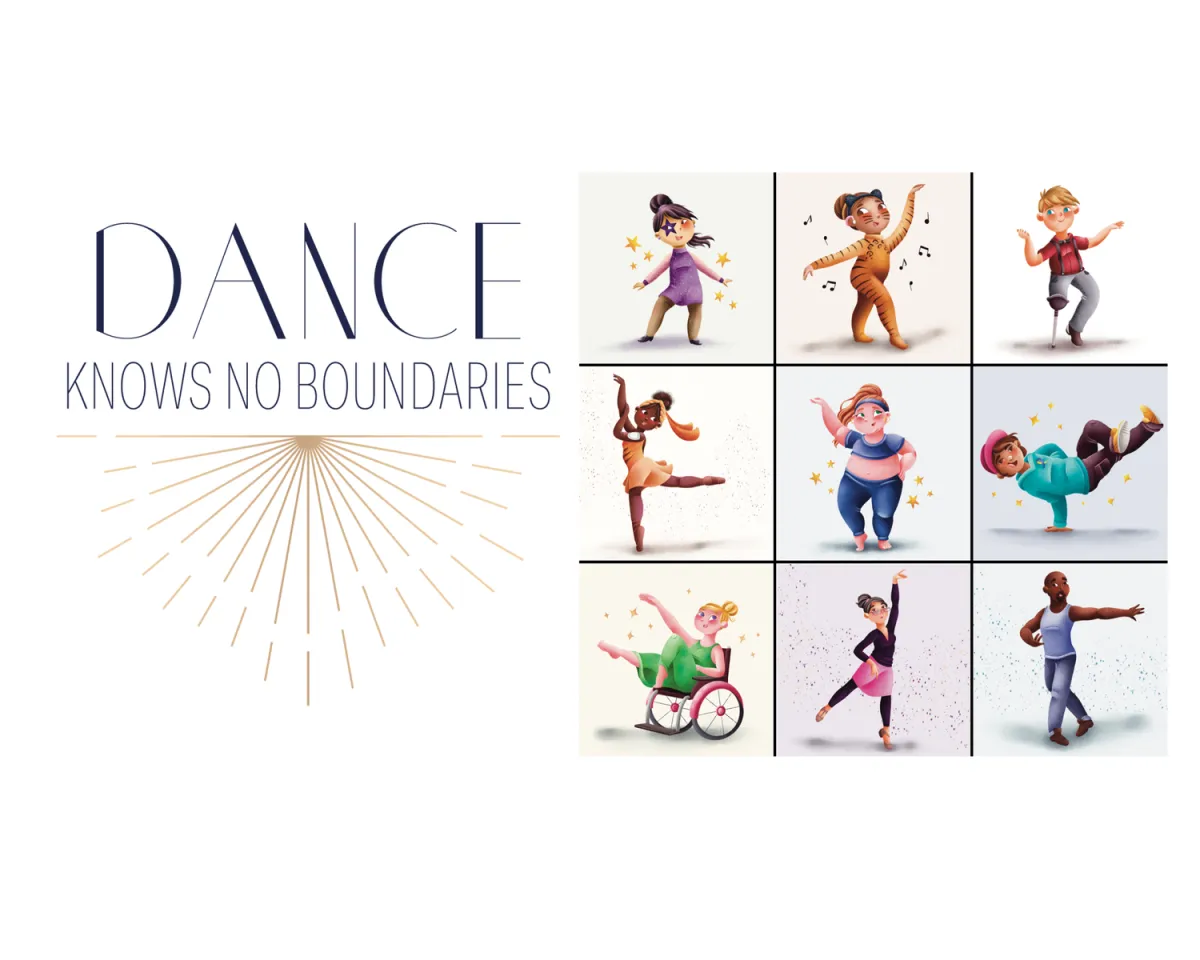
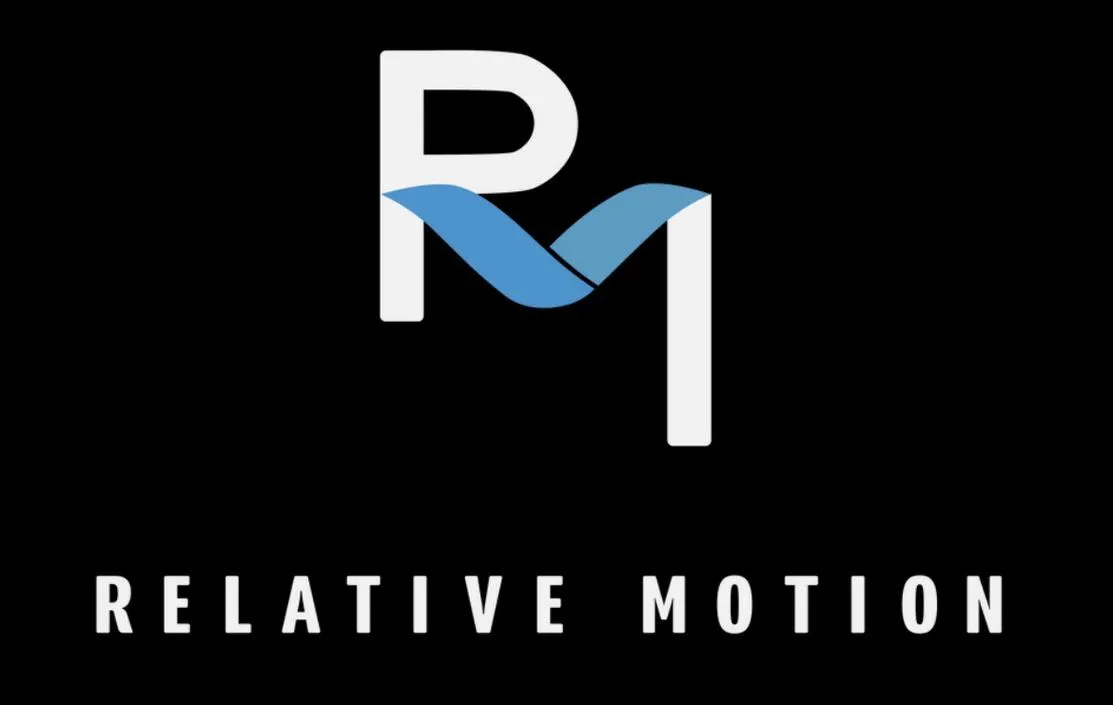
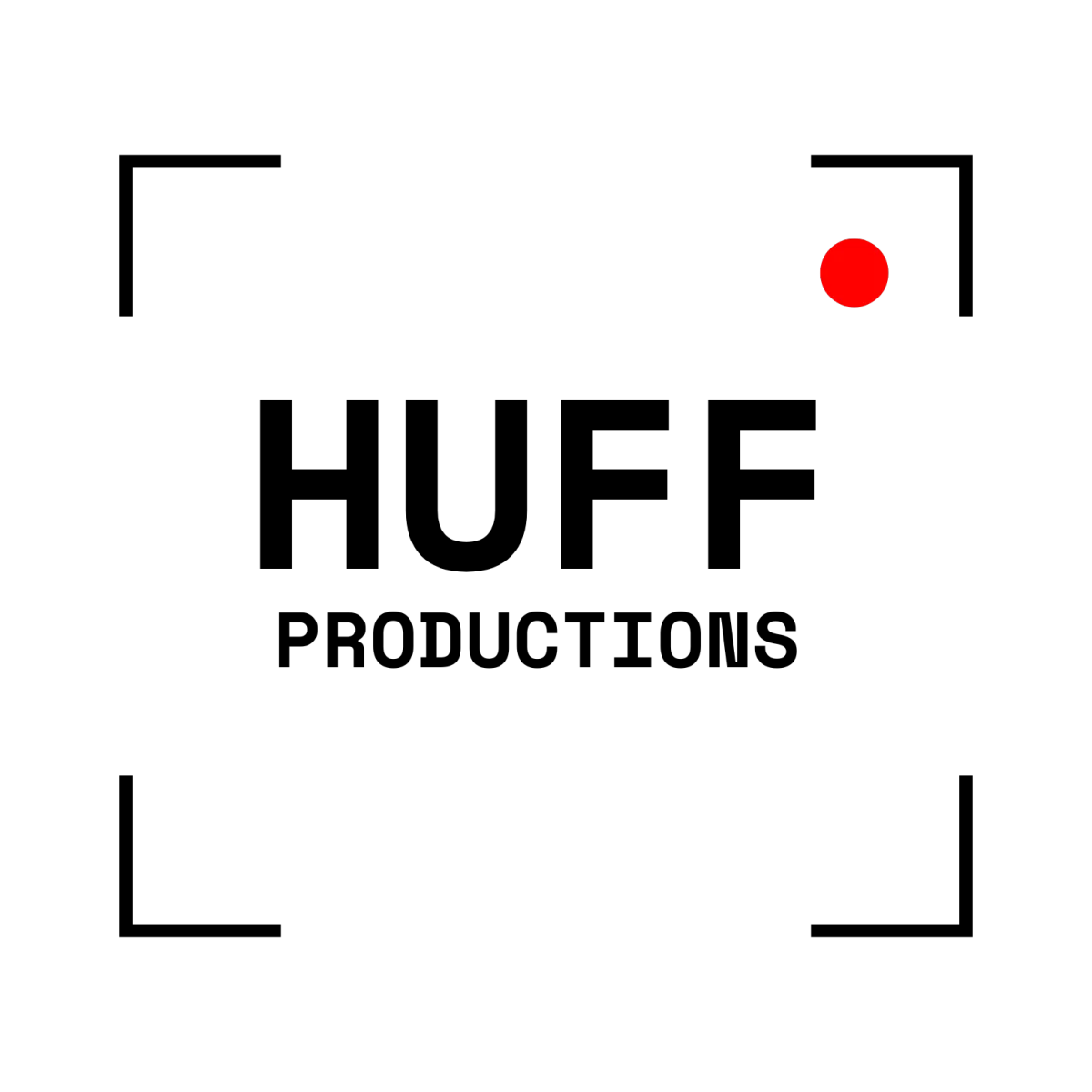
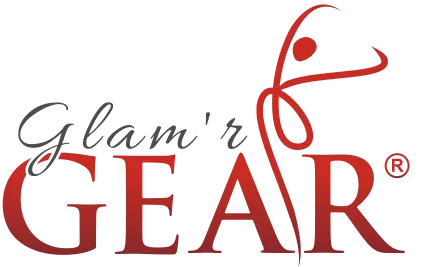
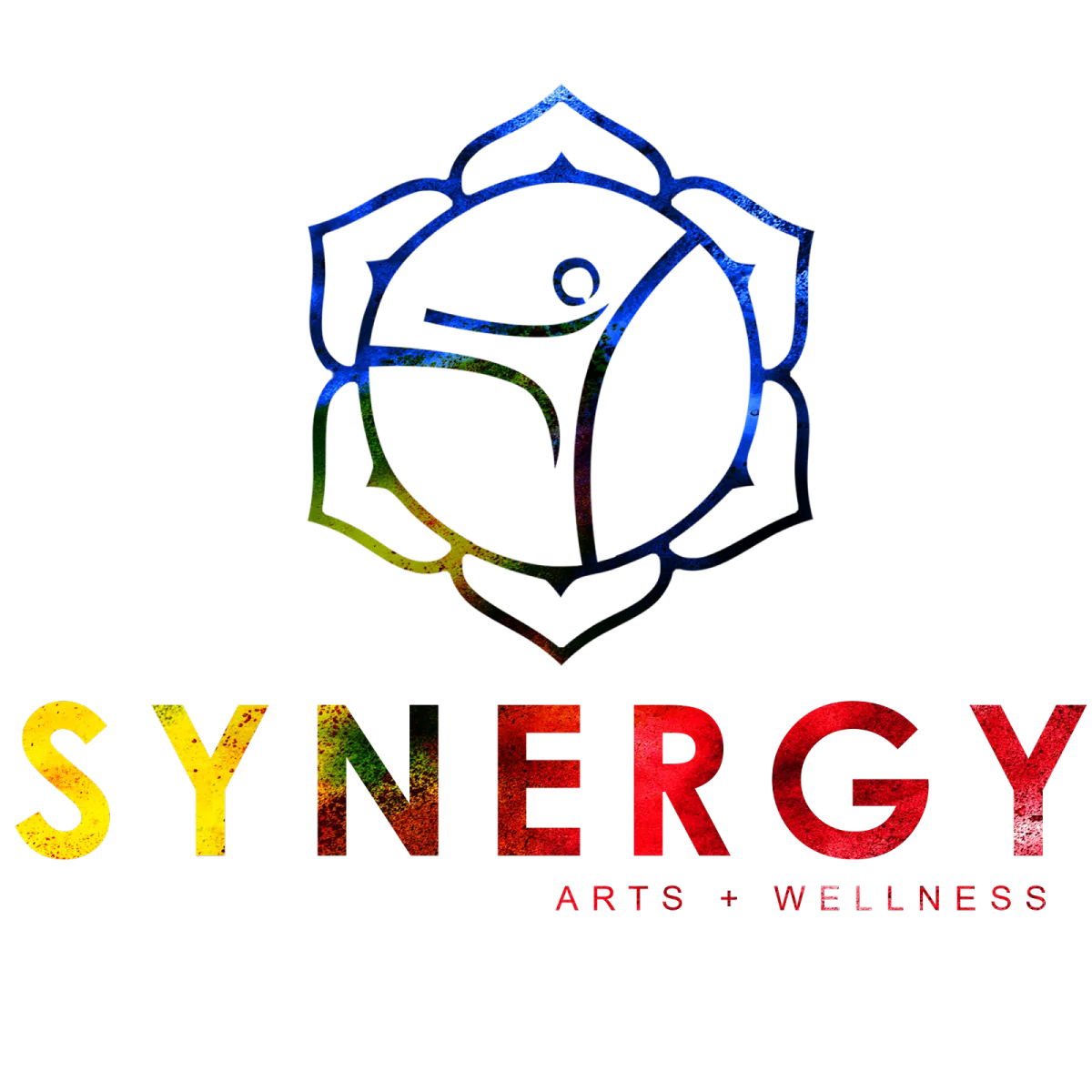
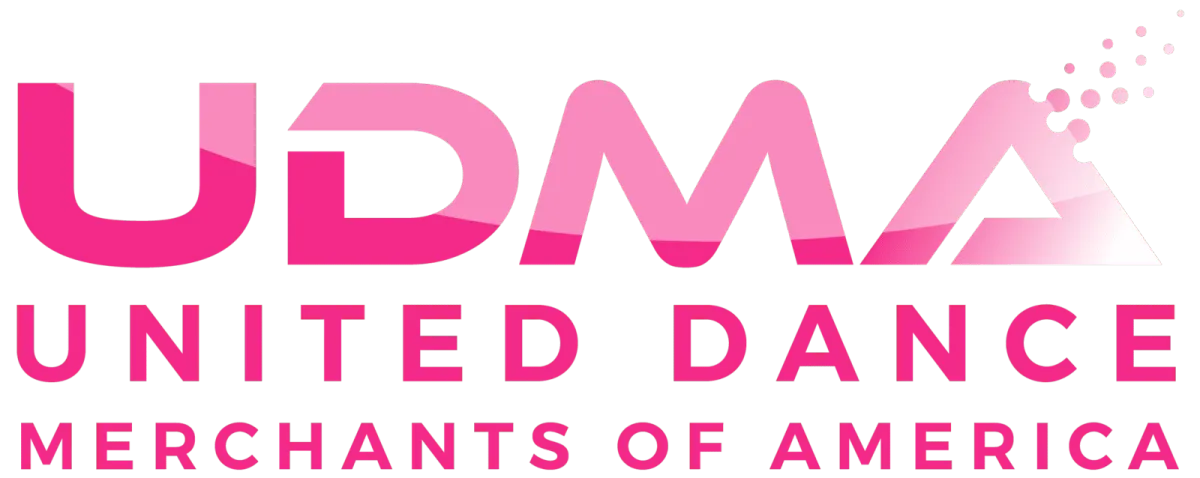


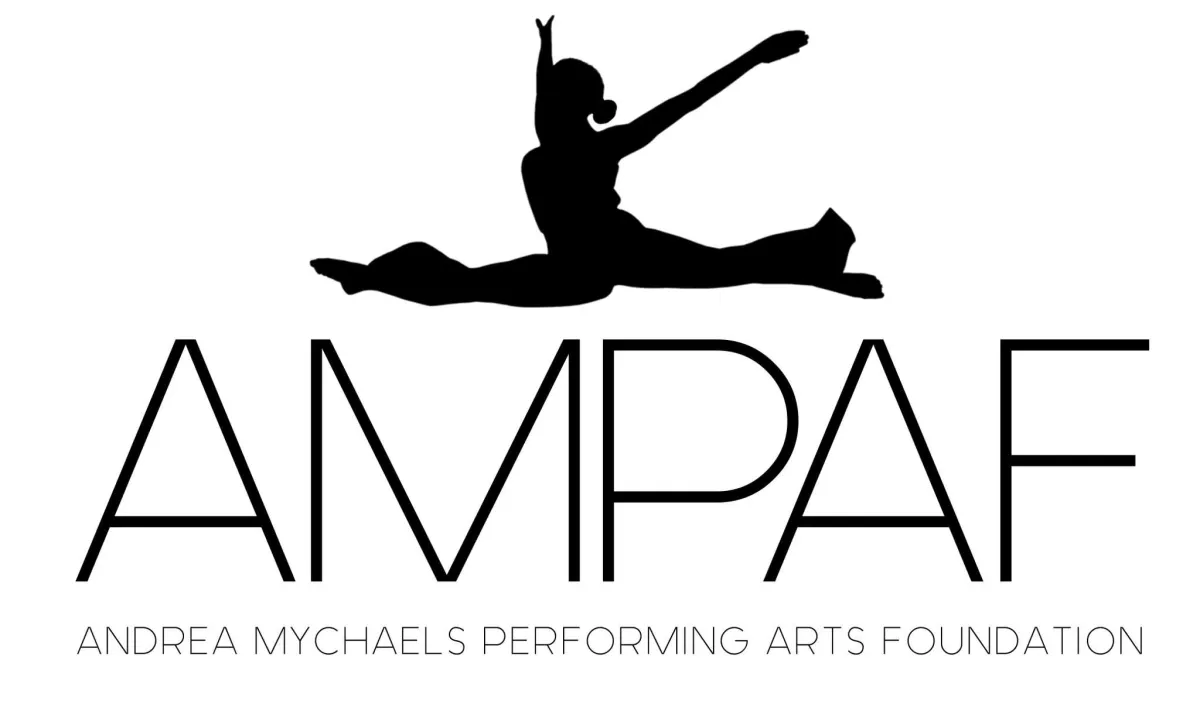
GET IN TOUCH
We love having conversations about all things dance! Most of our team has been in your shoes and we know how complex the planning process is for you and your dancers.
We are happy to guide you through registration, add you to the waitlist for an event, answer your questions or help you set your studio up for success at our events this season. Please reach out anytime!
@ Copyright 2025 - DECAdance Competition & "un"convention - All rights reserved
